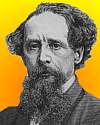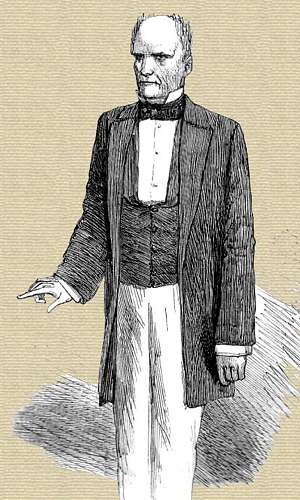 (source)
(source)
|
Charles Dickens
(7 Feb 1812 - 9 Jun 1870)
English novelist , the most famous of Victorian writers, who wrote many novels that remain popular, including The Pickwick Papers (1837), A Christmas Carol (1843) and A Tale of Two Cities (1859).
|
Thomas Gradgrind and Teaching Facts
from Hard Times (1854)
by Charles Dickens
[p.1, Chap. 1] “Now, what I want is, Facts. Teach these boys and girls nothing but Facts. Facts alone are wanted in life. Plant nothing else, and root out everything else. You can only form the minds of reasoning animals upon Facts: nothing else will ever be of any service to them. This is the principle on which I bring up my own children, and this is the principle on which I bring up these children. Stick to Facts, sir!”
The scene was a plain, bare, monotonous vault of a school-room, and the speaker’s square forefinger emphasised his observations by underscoring every sentence with a line on the school-master’s sleeve. The emphasis was helped by the speaker’s square wall of a forehead, which had his eyebrows for its base. while his eyes found commodious cellarage in two dark caves, overshadowed by the wall. The emphasis was helped by the speaker’s month, which was wide, thin, and hard set. The emphasis was helped by the speaker’s voice, which was inflexible, dry, and dictatorial. The emphasis was helped by the speaker’s hair, which bristled on the skirts of his bald head, a plantation of firs to keep the wind from its shining surface, all covered with knobs, like the crust of a plum-pie, as if the head had scarcely warehouse-room for the hard facts stored inside. The speaker’s obstinate carriage, square coat, square legs, square shoulders,—nay, his very neckcloth, trained to take him by the throat with an unaccommodating grasp, like a stubborn fact, as it was,— all helped the emphasis. “In this life, we want nothing but Facts, sir; nothing but Facts!” The speaker, and the school-master, and the. third grown person present, all backed a little, [p.2] and swept with their eyes the inclined plane of little vessels then and there arranged in order, ready to have imperial gallons of facts poured into them until them were full to the brim.
[Chap. 2] Thomas Gradgrind, sir. A man of realities. A man of facts and calculations. A man who proceeds upon the principle that two and two are four, and nothing over, and who is not to be talked into allowing for anything over. Thomas Gradgrind, sir—peremptorily Thomas—Thomas Gradgrind. With a rule and a pair of scales, and the multiplication table always (in his pocket, sir, ready to weigh and measure any parcel of human nature, and tell you exactly what it comes to. It is a mere question of figures, a case of simple arithmetic. You might hope to get some other nonsensical belief into the head of George Gradgrind, or Augustus Gradgrind, or John Gradgrind, or Joseph Gradgrind (all supposititious, nonexistent persons), but into the head of Thomas Gradgrind—no, sir!
In such terms, Mr. Gradgrind always mentally introduced himself, whether to his private circle of acquaintance, or to the public in general. In such terms, no doubt, substituting the words “boys and girls” for “sir,” Thomas Gradgrind now presented Thomas Gradgrind to the little pitchers before him, who were to be filled so full of facts.
Indeed, as he eagerly sparkled at them from the cellarage before mentioned, he seemed a kind of cannon loaded to the muzzle with facts, and prepared to blow them clean out of the regions of childhood at one discharge. He seemed a galvanising apparatus, too, charged with a grim mechanical substitute for the tender young imaginations that were to be stormed away.
- Science Quotes by Charles Dickens.
- Our Nearest Relation: The Gorilla - from All Year Round (1859) published by Charles Dickens





